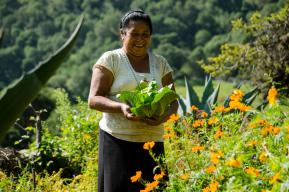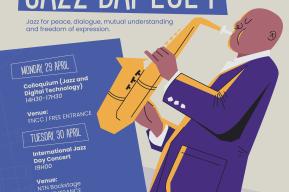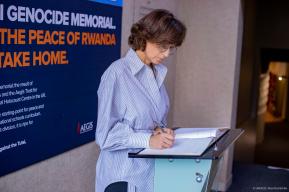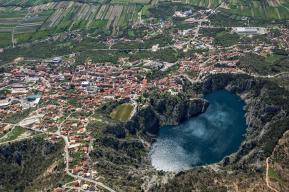Press release
On a visit to Rwanda, Audrey Azoulay calls for greater global efforts to protect the great apes
A leading player in the protection of mountain gorillas, the UNESCO Volcanoes Biosphere Reserve in Rwanda is celebrating its 40th anniversary this year. To mark the occasion, Audrey Azoulay, Director-General of UNESCO, undertook a three-day mission to the country to meet the authorities, scientists, forest rangers and local communities, praising their efforts to protect biodiversity. The trip ended on Friday with Ms. Azoulay participating as a ‘godmother’ in the Kwita Izina ceremony, which celebrates the new-born gorillas every year, and then meeting with President Kagame.
Worldwide, the survival of the great apes is in a critical condition. The international community must step up its efforts as quickly as possible if we are to prevent certain species from disappearing forever. The protection of these cousins of human beings, from whom we are separated by only 2% of our DNA, is a collective responsibility. All countries have a duty to play their part, first and foremost the most developed countries, by strengthening solidarity mechanisms with countries that are home to the great apes, particularly in Africa.

Rwanda, a successful example of conservation method
Over and above the question of resources, the Director-General of UNESCO emphasized the importance of the right methods. "As we have seen in Rwanda, species conservation succeeds when local communities are placed at the heart of the conservation strategy. Biodiversity protection measures must go hand in hand with measures that meet the needs of these local communities", she observed.
Since 1983, Rwanda has been using the UNESCO biosphere reserve model to develop a virtuous circle in which tourism revenues are reinvested both to finance national parks and to improve living conditions for local people. The approach has had very positive results.
The ancestral knowledge and skills of local communities in protecting nature must also be better recognized. Countless solutions exist locally, which need to be identified and passed on. This is the purpose of the UNESCO Convention for the Safeguarding of the Intangible Cultural Heritage.

More than 30 UNESCO sites host great apes
The mountain gorilla saw its population decimated during the 20th century, due to deforestation, poaching and the transmission of diseases by humans. Over the last four decades, the joint efforts of the national authorities, local communities, NGOs and UNESCO have turned the situation around.
In 1980, only 250 of these gorillas remained, but now more than a thousand live in the wild, spread across three countries. Confirming this progress, the mountain gorilla was removed from the list of "critically endangered" species by the IUCN at the end of 2018.
Today, UNESCO protects 900,000 hectares of mountain gorilla habitat: the Volcanoes Biosphere Reserve in Rwanda, created in 1983, the Bwindi Impenetrable Forest in Uganda, a World Heritage Site since 1994, and the Virunga Park in the DRC, a World Heritage Site since 1979. These three areas alone are home to more than 80% of recorded specimens.
Worldwide, more than 30 UNESCO sites – both biosphere reserves and world heritage sites - are home to great apes. The Organization supports these sites through research and training programmes. It also fosters the exchange of best practices and problems between the managers of these sites.
Press contact
Matthieu Lamarre, m.lamarre@unesco.org









